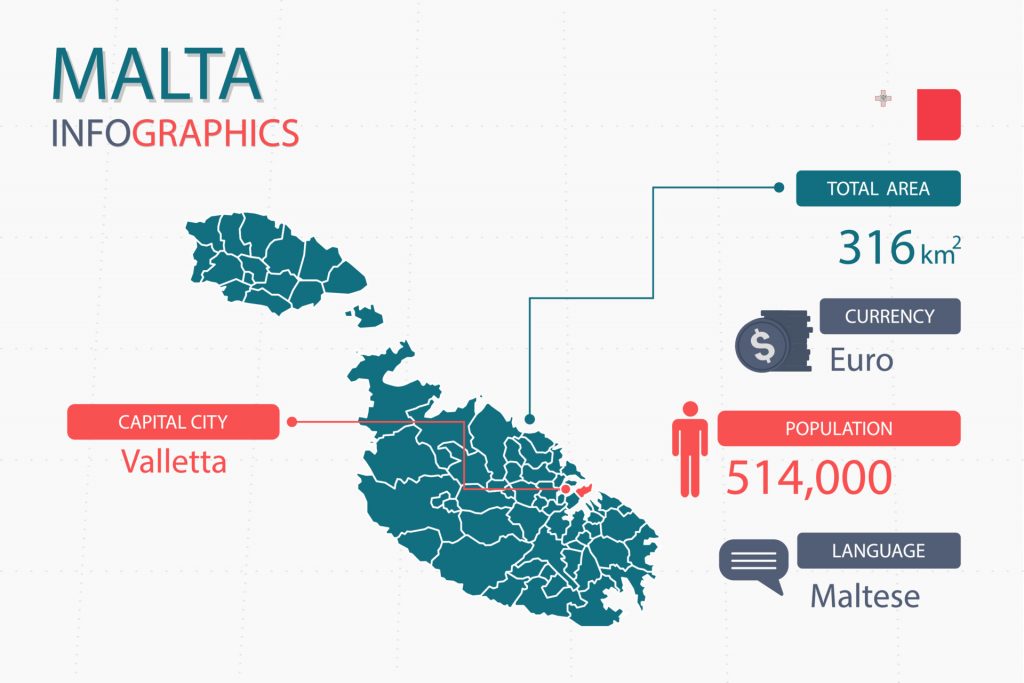The origins of the Maltese Language
Maltese is an official language of Malta and, as a nation in the European Union, has official status there as well. In fact, it is the only Semitic language that holds official status in the European Union. In Malta, it is also the national language and holds official status alongside English. It is spoken by about 520,000 people who mainly reside in Malta.
Maltese has a unique history as it derives originally from a distinct dialect of Arabic called Siculo-Arabic. This dialect originally emerged in Sicily. Unlike other varieties of Arabic, it evolved independently from both Standard and Classic Arabic. Therefore, linguists classify it separately from the main body of Arabic dialects. In addition, its grammar has been deeply influenced by the languages surrounding Malta, Italian and Sicilian, making it somewhat of a hybrid language. With the geographical separation of Maltese speaking communities from other Arabic-speaking communities throughout its history, as well as surrounding languages playing political, cultural, and social roles in shaping these communities, the language has certainly developed unique characteristics throughout its history.
Maltese vocabulary is composed of the original Siculo-Arabic base, Italian, Sicilian, and English. Basic everyday words and vocabulary come from its Arabic origins. At the same time, approximately 50% of the vocabulary is derived from Italian and Sicilian. English words have entered the Maltese language due to both British colonization, and the fact that English is not only an official language in Maltese, but widely used throughout Malta. Other sources of loanwords come from French as well. Even though it is originally an Arabic language, there is limited mutually intelligibility between Maltese and varieties of Arabic spoken today because of its unique developmental history.

Further distinguishing Maltese from varieties of Arabic is the writing system. Throughout history, the Latin script has been used to write Maltese. In fact, it is the only Semitic language that is written with the Latin script. The modern orthography was introduced in 1942 and it contains thirty letters. In addition to the standard set, there are additional letters that are derivative of the original Latin letters. Interestingly, there is no C, but rather there is a C with a dot on top, which makes a sound like the ‘ch’ in the word ‘church’. There are also accent marks to indicate the stress on syllables in certain words. Maltese is written from left-to-right. Throughout history, written Maltese and spoken Maltese have been quite different, with many linguists characterizing the language as one that is diglossic, a situation where written and spoken registers are so different that they are at times not mutually intelligible.
The Maltese language can be traced back to the early eleventh century. In Sicily, Siculo-Arabic was spoken due to the Moorish conquest. The Muslims who occupied this area spoke this dialect of Arabic. A number of settlers moved from Sicily to Malta, and those communities brought their native language with them. These settlers were not all Muslims, even though they may have shared cultural and linguistic roots. In the late century, due to the Norman conquest and the following expulsion of Muslims from the general area of Malta and Sicily, the Maltese speaking community was isolated from its linguistic mother of Arabic. Thus, Maltese evolved distinctly from other forms of Arabic. Rather, it developed alongside Italian dialects that were prominent at the time.
The first written record of the language was documented in a will that was written in 1436. In this will, the language was referred to as the Maltese language. A dictionary dating back to the sixteenth-century was also discovered. This dictionary was a bilingual dictionary between Maltese and Italian. Other linguistic references have been published over the centuries including additional dictionaries and grammars.
Nowadays, Maltese is spoken mainly in Malta. However, many Maltese communities exist in other countries. Italy, Australia, the United Kingdom, and the United States all have Maltese speaking communities. In Malta, there also exists a number of dialects. Urban dialects have emerged, but they are close to the standard language. More rural dialects also exist, and these dialects tend to conserve their Arabic roots in terms of linguistic structures and vocabulary.
The linguistic situation in Malta is as unique as its national language. As Malta is a multilingual country, Maltese is not the only language that exists in mass media. English and Italian are also prominent. In addition, radio and TV stations from Italy also are broadcasted in Malta because of the two countries’ close proximity to one another. English and Maltese seem to be used equally in mass media, especially in newspapers. In addition, even though the internet tends to be a vehicle of language diffusion.
Given this linguistic situation, the general population is both fluent in both Maltese and English and everyday parlance exhibits much code-switching depending on the register and social situation. Nevertheless, Maltese still has a long history of literature that dates back to 1470. There is also a flourishing literary tradition, with the first novel being published in 1863. After the two World Wars, contemporary literature has also been produced in the language. In fact, while Maltese and English compete in terms of general media, the literature that comes from Malta is mostly in the Maltese language, with a few works in English and Italian. In a way, Maltese has become a language of literary prestige in Malta. With so many writers and speakers exhibiting pride over the use of the language, Maltese will remain a crucial part of the identity of Malta.
VEQTA can provide you with a perfect Maltese translator for your Maltese translation, English to Maltese translation and Maltese to english translation for the your targeted locale. Our translations to Maltese are created with your target audience in mind to meet your expectations.
If you need to translate Maltese – Get in touch today!
A dedicated team of Maltese translators who combines Experience, Specialized Subject Matter Expertise with Translation Practices to deliver quality second to none.
Maltese Document Translation
Maltese Legal Translation
Maltese I.T Translation
Maltese Health & Fitness Translation
Maltese Medical Translation
Maltese Marketing Translation
Maltese Financial & Accounting Translation
Maltese Tourism & Travel Translation


